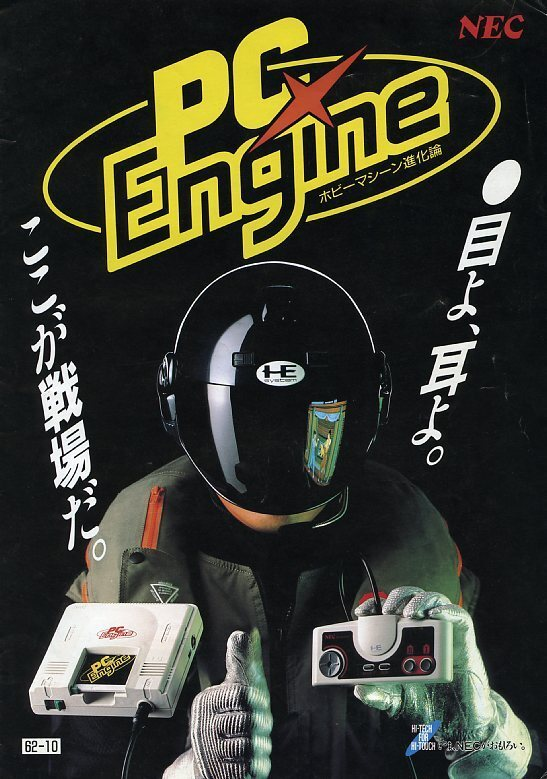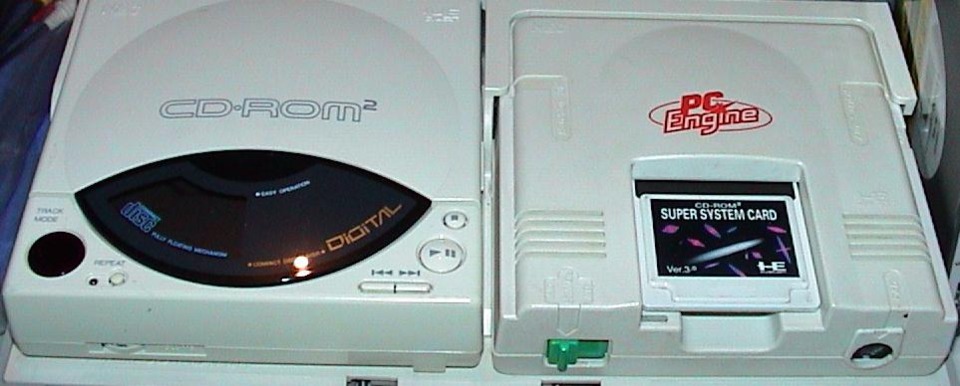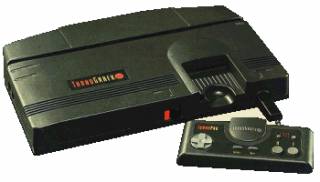
Hi!
Again!
Several years ago, when the hills were young, I started NamCompendium. My goal was, and remains, an exploration of the entire output of Namco. That is not done! It will surprise likely zero folks reading this that the last few years have not gone entirely to chalk for me, as they likely have not for the readers either. Plans change, schedules change, priorities change, and my ability to devote the sort of time I’d like to a serious, measured capital c Chronogaming thing has been impacted. It does claw at the back and stem of my brain, the slow progress of that project.
So, what the hell, let’s start another one!
I am on the record stating that NEC’s PC Engine, known also by the street name “TurboGrafx-16”, is a top five console for its industry impact. I said that, without having grown up with one, and with an entire pile of misgivings about the platform. It is very easy to blast holes in the system with a Hindsight Cannon. A platform with peculiar sound, a limiting storage format (for a time), and an absolute over-reliance on arcade and STG experiences at the expense of other broader genres. That’s before you even begin to address the anemic efforts to sell the system in North America, or the phantom presence of the console in Europe and other territories. A niche system for only the most slobbering, degenerate shooter fans, done and dusted.
And yet.

What goes unsaid is just how wildly pioneering the system actually was, over and over again. Suppose I were to tell you the story of a major Japanese home electronics manufacturer whose CD-based platform entered and disrupted a domestic market formerly locked down by Nintendo. If you think this is the tale of Sony and its PlayStation, you’d be wrong. NEC pulled off the same stunt six years earlier.
There was a shining period, albeit a brief one, where the PC Engine stood toe to toe with the Famicom in console sales. This obviously did not last, and various web citations have the PC Engine selling between 6 and 15 million units across all regions; for reference the lifetime sales of the Sega Master System surpassed 20 million, and NES/FC sales trebled that. Still, as a first go in an industry with three established players (Nintendo, Sega, and a slowly dying Atari) the system availed itself quite well.
(I'll note here that I've had a hell of a time finding concrete sales numbers for PC Engine software outside of running totals in Famitsu. If you have a source for this information, I'd love to talk to you.)
There’s also the bit where the system pioneered CD-ROM compatibility, being the first home platform to support the format. The system over time would morph into a disc-based platform with a vestigial cartridge slot, used primarily to house more RAM for increasingly complex CD-based titles. It was the compact disc format which allowed the PC Engine to live its quixotically long life, receiving its final commercial release in Anno Domini 1999. Consider that. The Famicom it struggled against had been dead and buried for five years when the PC Engine received its last game. The Mega Drive and Master System both limped into 1998 but no farther, officially. Yet the same guts of a console one purchased in the Showa era, during the Nancy Reagan administration, had one last glimmer of life left in it for the truly deranged fans a year after the launch of the Dreamcast.
I think that’s neat as hell. Mayhaps somebody should write about this thing a bit. Might as well be me. And, seeing as GB Blog demigods @mento, @borgmaster, @arbitrarywater, and even @zombiepie make a lot of hay writing shorter form pieces about Games What They Played Lately, I should be allowed to write about these games without having to commit to feverishly trying to interlibrary loan Japanese reference materials to cross-check company names and patent dates pertaining to Namco (true story).

So, I’m going to take a brisk stroll through this funky little freak’s library for as long as I see fit. I’ll be relying on a lot of groundwork laid by the myriad hands who have touched ol’ Jimmy Wales’ list of PC Engine games by date, as well as the editors of PC Engine Bible and the dates on the site, to present this in a running release order that is as close to accurate as I could hope. I say this up front because the early goings of this console are just a little bit silly.
I’m going to prebake a section for every game in this series, “Foreknowledge”, to outline what I know (or think I know) about the title in question. Then I’ll play each game for as long as I care to (no Mento-esque systems for me) and relay my thoughts. Finally, I’ll throw in some very official numbers.
On that end, I will probably be doing some sort of tier list thing out of this. Borgmaster, your quartile system is so deliciously devised that I’m probably stealing it. Too bad you can’t patent math, sucker!
(Just fooling, you seem like a decent guy. I am stealing your thing though.)
Something I intend to append to each entry is particularly spicy. As noted above, the TurboGrafx-16 was a commercial flop in North America, and as a result the distribution of games here was quite thin. This has led to a wildly distorted aftermarket, its closest cousin being the Sega Saturn, where the NTSC-U versions of games can cost several times the going rate of their NTSC-J versions. Whenever applicable, I’ll provide this “Turbo Ratio” based on street prices per your favorite website and mine, pricecharting.com
A final note: Chris “spida1a” Bucci on YouTube recently wrapped up, after several years, a complete video exploration of the North American TG16 library called Turbo Views. He was there at the launch as a young person, and the enthusiasm he brings to his videos is truly infectious. May we all have something in our lives that brings us as much joy as talking about the dang TurboGrafx gives to him. Where applicable, I’ll be embedding his videos.
Next week, let’s kick this thing off with a piece about how the launch games for this system were volumes 2 and 4, for some reason.
***********

Log in to comment